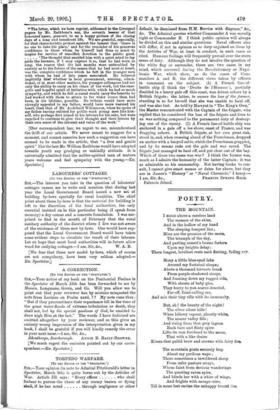TORPEDO WARFARE.
[To THE EDITOR OF TER " SPECTATOR:1
Sra,—Your opinion (in note to Admiral FitzGerald's letter in Spectator, March 8th) is quite borne out by the Articles of War. Article III. says : " Every officer who shall forbear to pursue the chase of any enemy beaten or flying
shall, if he has acted through negligence or other
default, be dismissed from H.M. Service with disgrace," dm., Ste. The Admiral queries whether Commander A was morally right or Commander B. I think public opinion will always be divided on this and similar questions. Naval officers also will differ, if not in opinion as to duty enjoined on them by the Articles of War, at least in conduct, in such cases as cited. Humane feelings will frequently prevail over the stern sense of duty. Although they do not involve the question of the white flag or surrender, there are two cases in my mind, which occurred during the Revolutionary or Napo- leonic War, which show, as do the cases of Com- manders A and B, the different views taken by officers in command on the subject. (1) A French line-of- battle ship (I think the Droits de l'Homme '), partially disabled in a heavy gale off this coast, was driven ashore by a British frigate; the latter, to ensure the loss of the former, standing in so far herself that she was unable to haul off, and was also lost. As told by Marryat in " The King's Own," the Master remonstrated with the Captain of the frigate, who replied that he considered the loss of the frigate and lives to us was nothing compared to the paramount duty of destroy- ing one of the enemy. (2) A French line-of-battle ship was anchored in a gale off a lee shore, coast of France, and was dragging ashore. A British frigate, at her own great risk, stood in, and, when crossing ahead of the Frenchman, dropped an anchor with a buoyed cable, which the Frenchman grappled, and by its means rode out the gale and was saved. The frigate just managed to haul off, and got clear out of the bay. Which of these two cases was war ? I think the former was, much as I admire the humanity of the latter Captain : it was as admirable as his seamanship. Not having books to con- sult, I cannot give exact names or dates for above, but they are in James's "History" or "Naval Chronicle," I fancy.—






































 Previous page
Previous page